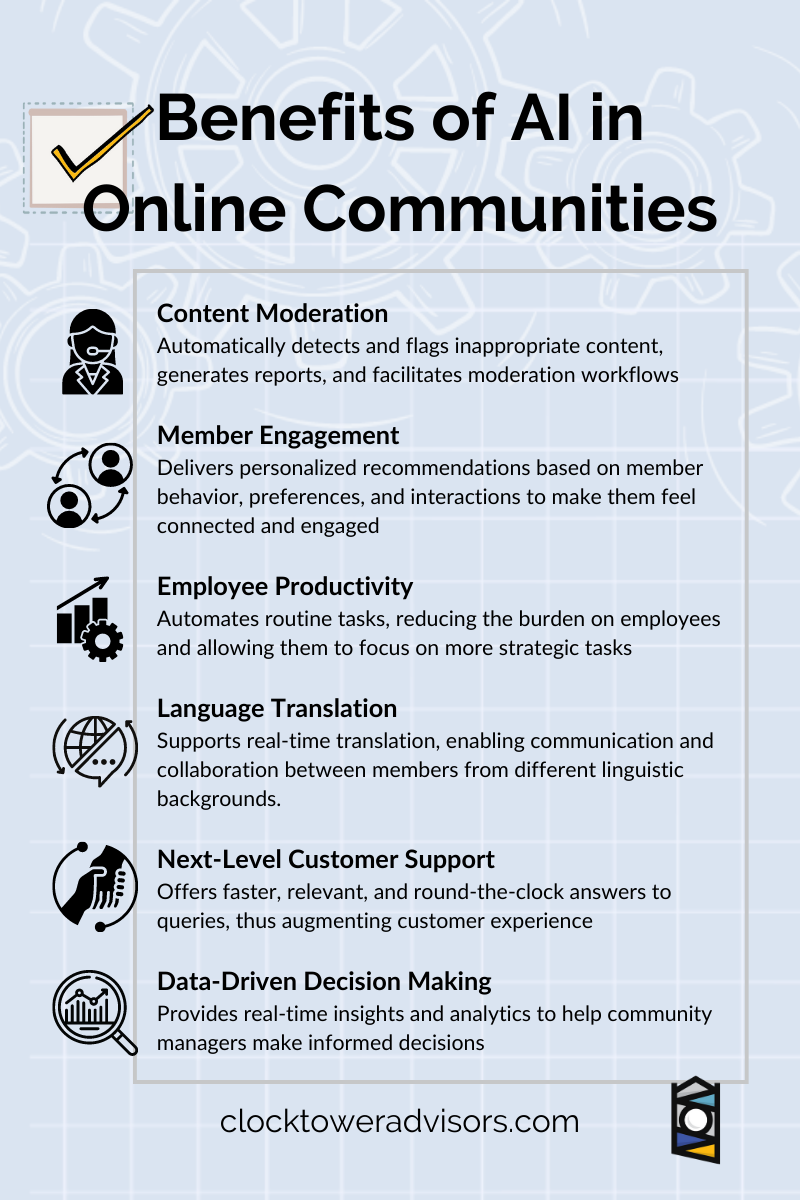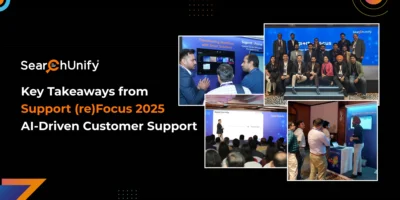
Building a vibrant online community where members can connect, share ideas, and engage in meaningful conversations is vital in achieving business success. Among the many benefits, it helps you drive traffic to the website, strengthen relationships with customers, and drive revenue growth.
But the question frequently asked is: how to enhance the online community experience to ensure active member engagement and self-service success? While there are myriad technologies available, Artificial Intelligence (AI), in particular, stands out as a promising ally.
Forward-thinking business leaders have already recognized its potential in enhancing online communities. After all, it empowers them to deliver personalized recommendations and foster seamless interactions through chatbots, community widgets, and other AI-fueled applications.
Did you know that 57% of community leaders plan to increase their AI investment by at least 25% over the next year?
In this blog post, we will delve deeper into the capabilities of AI for online communities, explore its diverse applications, and implementation considerations.
Unleashing the Potential of AI for Online Communities

AI in Action: Exploring Its Versatile Use Cases in Online Communities
Organizations are actively exploring or strategizing the use of AI in three primary spheres: Customer Experience, Community Management, and Real-Time Analytics.
Let’s understand them in depth.
Customer Experience
Did you know that 77% of brands believe that customer experience is the key competitive differentiator?
Artificial Intelligence plays a significant role in transforming the customer experience. How you may ask? By analyzing customer profiles and activities, it provides advanced personalization, ensuring that they receive relevant content recommendations. Additionally, the integration of intelligent chatbots enables seamless interactions and instant support, enhancing customer satisfaction and engagement.
Let’s say a customer has recently bought a smartphone but is encountering problems with its camera. In such a scenario, the chatbot can swiftly determine the exact model of the device and propose personalized troubleshooting solutions specific to that model. Furthermore, it can offer valuable suggestions, such as relevant forum threads, articles, or video tutorials that delve into similar camera-related concerns. This empowers the customer with self-help alternatives to tackle the issue effectively
Community Management
AI has emerged as a game-changer in effectively managing online communities. By harnessing its power, community managers can easily identify key influencers, actively solicit their feedback, and collaborate with them to promote the project.
Furthermore, it plays a vital role in content and member behavior moderation within communities. AI-based systems can efficiently filter and moderate user-generated content, ensuring that inappropriate or harmful content is swiftly detected and dealt with. This helps create a safe and respectful environment that encourages meaningful engagement and interaction among community members.
Real-Time Analytics
AI empowers online communities with valuable insights by analyzing vast amounts of data. Community managers can gain a deeper understanding of community health, measure return on investment (ROI), identify areas for improvement and investment, and track customer behavior trends. As a result, they can make better decisions and drive continuous enhancement of products and services.
Key Considerations For Deploying AI in Online Communities
While the merger of AI and online communities has unleashed a sea of opportunities for businesses, many enterprises are still skeptical about it. To address these concerns, consider the following factors before deploying it in online communities to open a path to success:
1. Defining Business Objectives
Before embarking on any AI initiative, it is crucial to establish clear business objectives. This involves identifying specific problems or challenges that can be tackled using advanced technology. For example, an online community platform may aim to improve moderation efforts, foster a more inclusive environment, or enhance user satisfaction.
By defining these objectives, organizations can align their initiatives with the desired outcomes, ensuring that resources are focused on relevant areas.
2. Evaluating the Deployment Timeline
Deploying an AI project requires a careful evaluation of the timeline needed for implementation. Organizations should assess the readiness of their infrastructure, data availability, and the expertise required to develop and implement intelligent systems in communities. This way, they can achieve the level of accuracy without going through multiple iterations.
3. Adapting AI Systems for Long-term Social Changes
Online communities are dynamic; societal norms and preferences can evolve over time. Therefore, it is essential to consider the long-term adaptability of AI systems to accommodate these changes.
For instance, advanced moderation systems must be designed to recognize emerging forms of harmful content (recent examples include “deepfake” videos that use machine learning technology to show a real person saying and doing things they haven’t) or new methods of spreading misinformation. Regular updates and continuous monitoring of these models can improve their effectiveness in addressing evolving challenges.
4. Setting Threshold Performance Levels
To add value to online communities, AI systems must meet a threshold performance level. Organizations should identify precision (the fraction of relevant search results among the total search results), recall (the ability of a search engine to retrieve all the relevant results from the corpus), or other relevant metrics and make appropriate tradeoffs. For example, when analyzing sentiment in a community context, precision might be more important than recall whereas in a security scenario, recall is as essential as precision since it is a must to eliminate the chance of security violation incidents.
5. Mitigating Bias
AI algorithms are only as unbiased as the data they are trained on. Take steps to ensure that the data used to train models is diverse, representative, and free from inherent biases. Also, monitoring and auditing them consistently ensures that the data quality supports the operational goals.
6. Acknowledging the Rapid Evolution of the AI Space and Communities
The rapid evolution of the AI space brings significant opportunities for transforming community platforms. For instance, breakthrough LLM-powered tools, such as ChatGPT, trained on massive amounts of text data can be leveraged to provide personalized and interactive user experiences.
The focal point for businesses here is to recognize the fast-paced evolution and stay informed about the latest advancements. Regularly assessing the implications of emerging technologies on online communities can help refine strategies and remain relevant.
Ready to Revolutionize Your Online Community with AI?
Harnessing the power of AI can unlock next-level user experiences, improve moderation efforts, and streamline operations. If you are all set to deploy it in your online community, this free guide can help you with creative prompts to start using advanced tools more productively. Download it today to kick-start your journey of success!











